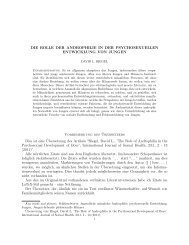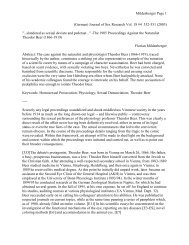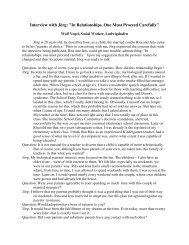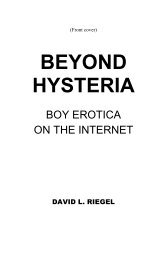Myths of Childhood Sexuality - Shfri.net
Myths of Childhood Sexuality - Shfri.net
Myths of Childhood Sexuality - Shfri.net
You also want an ePaper? Increase the reach of your titles
YUMPU automatically turns print PDFs into web optimized ePapers that Google loves.
to be applauded for having called attention to this old truth, but, unfortunately, she failed to<br />
pursue her insight to its logical conclusions. Nevertheless, even though she attempted to s<strong>of</strong>ten<br />
the impact <strong>of</strong> her rediscovery, she <strong>of</strong>fended "a whole academic and therapeutic structure [which]<br />
rides on the old model <strong>of</strong> sexual abuse" by publishing data and findings which "flew in the face<br />
<strong>of</strong> several decades <strong>of</strong> politically correct trauma theory, feminist theory and sexual politics," and<br />
which "had the potential to undermine a host <strong>of</strong> expensive treatment and prevention projects."<br />
(Zuger, 2010). Members <strong>of</strong> what Dineen describes as the "psychology industry" (2001) take a<br />
dim view <strong>of</strong> those who might interfere with their cash flow.<br />
However, for all <strong>of</strong> the heresies <strong>of</strong> which she is accused, Clancy is still a product <strong>of</strong> the<br />
entrenched pseudo-discipline <strong>of</strong> victimology. When she designed her investigation back in the<br />
1990s, she failed to foresee the need for her sample to be drawn from all <strong>of</strong> those who had a<br />
"childhood sexual experience with an older person," as was done in a similar investigation<br />
conducted on the Inter<strong>net</strong> by Riegel (2009). Instead, she repeated the errors <strong>of</strong> many <strong>of</strong> her<br />
predecessors (e.g. Kersher and McShane 1984), and placed newspaper advertisements asking<br />
"Were you sexually abused as a child?" (Clancy, 2009, p. xi). She thus insured that her responses<br />
would be almost exclusively from those participants in such childhood sexual activities who had<br />
to some degree accepted and internalized the "abuse" hypothesis that is a fundamental te<strong>net</strong> <strong>of</strong><br />
victimological dogma, and that those who remained free from this negative influence would be<br />
disinvited. However, even with this faulted approach, much to her surprise she found that few <strong>of</strong><br />
her respondents reported their childhood experiences as having been traumatic at the time they<br />
happened.<br />
Clancy recognized that something was drastically amiss in the dichotomy between what<br />
she found and what she had been taught, another insight for which she is to be commended. But<br />
even though she repeatedly mentioned her doubts in her book, she was unable or unwilling to<br />
sort them out and come to terms with them. It is difficult to argue that children do not derive<br />
physical pleasure from nonviolent genital stimulation, or that they are not likely to intuitively<br />
perceive such experiences as benign, if not positive, absent negative cultural influences. She<br />
finally rationalized away the fact that most <strong>of</strong> her respondents found their childhood experiences<br />
non-traumatic at the time by claiming that "Sexual abuse becomes traumatic later on" (p. 116)<br />
after the child achieves and employs a more mature understanding. Clancy labels this proposed<br />
phenomenon "reconceptualization," a process she claims, based on her biased and<br />
unrepresentative sample, is characteristic <strong>of</strong> "most cases <strong>of</strong> sexual abuse ..." (p. 121), but Green<br />
(2010) sees it in a different light: "Thus, it is this aura <strong>of</strong> evil in the adult world that energizes the<br />
social construction <strong>of</strong> trauma that attaches to experience that was not traumatic. Contact morphs<br />
to abuse."<br />
So, then, is reconceptualization a legitimate internal and natural development, or just<br />
another name for iatrogenic brainwashing? Bender and Blau observed "At first the children<br />
showed no guilt, but this tended to develop ... as they were exposed to the opinion <strong>of</strong> parents and<br />
court <strong>of</strong>ficials ... and [this developed guilt] seemed ... not to carry any real conviction..." (1937,<br />
pp. 510-511). Constantine and Martinson noted: “Negative reactions <strong>of</strong> parents [and other adults]<br />
. . . to a child’s sexual encounters, aside from their function <strong>of</strong> inducing guilt, can be . . . the most<br />
psychonoxious aspect <strong>of</strong> the entire experience." (1981, p. 241, cf. Malón, 2009a), while Farson<br />
observed that "The most ruinous situations are usually . . . the community's response to the act<br />
when it is discovered" (1974, pp. 147-148).. A child whose willing relationship with an older<br />
6






